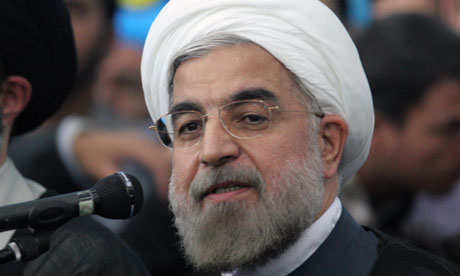 |
| Hassan Rouhani (Photo: Mohsen Shandiz/Corbis) |
In an interview with NBC News days before he travels to New York for a U.N. appearance, the new Iranian president also insisted he had "complete authority" to negotiate a nuclear deal with the United States and other Western powers.
"We have time and again said that under no circumstances would we seek any weapons of mass destruction, including nuclear weapons, nor will we ever," Rouhani said when asked whether he would forswear nuclear arms.
Rohani's conciliatory comments appeared to be another sign of his willingness to work toward a diplomatic solution in Iran's bitter nuclear standoff with the West. Speaking to the U.S. network at his presidential compound in Tehran, Rouhani said the tone of a letter he had received from President Barack Obama, part of a recent exchange of messages between the leaders, was "positive and constructive."
Iran's supreme leader, Ayatollah Ali Khamenei, has said that nuclear weapons development would be inconsistent with Islamic values.But questions remain about how much bargaining room Khamenei, a staunch promoter of Iran's nuclear program, will give Rohani's government, whether in secret talks with Washington or in multilateral discussions with major powers. Comments on Tuesday by Khamenei about the need for "flexibility" suggest a new willingness at the highest level to explore a compromise solution to Tehran's dispute with the West. "This government enters with full power and has complete authority," Rohani said, according to an NBC translation. "I have given the nuclear negotiations portfolio to the foreign ministry. The problem won't be from our side. We have sufficient political latitude to solve this problem."
Since Rohani was elected president in June, the centrist cleric has called for "constructive interaction" with the world, a dramatic shift in tone from the strident anti-Western rhetoric of his predecessor, Mahmoud Ahmadinejad.
Obama said in a television interview on Tuesday that he was prepared to test Rohani's willingness to open a nuclear dialogue, but he did not back away from previous U.S. demands. Rouhani said Obama wrote to him first, congratulating him on his election and raising "some issues of interest," and the Iranian president responded. Obama told Rohani in their exchange that the United States was "ready to resolve the nuclear issue in a way that allows Iran to demonstrate that its nuclear program is for exclusively peaceful purposes," White House spokesman Jay Carney said.

.jpg)
.jpg)


No comments:
Post a Comment